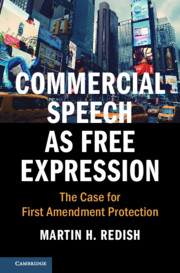Book contents
- Commercial Speech as Free Expression
- Cambridge Studies on Civil Rights and Civil Liberties
- Commercial Speech as Free Expression
- Copyright page
- Dedication
- Contents
- Preface
- Acknowledgments
- 1 Commercial Speech and the Values of Free Expression
- 2 False Commercial Speech and the First Amendment
- 3 The Right of Publicity, Commercial Speech, and the Equivalency Principle
- 4 Compelled Commercial Speech and the First Amendment
- 5 Scientific Expression and Commercial Speech
- Conclusion
- Index
4 - Compelled Commercial Speech and the First Amendment
Published online by Cambridge University Press: 21 May 2021
- Commercial Speech as Free Expression
- Cambridge Studies on Civil Rights and Civil Liberties
- Commercial Speech as Free Expression
- Copyright page
- Dedication
- Contents
- Preface
- Acknowledgments
- 1 Commercial Speech and the Values of Free Expression
- 2 False Commercial Speech and the First Amendment
- 3 The Right of Publicity, Commercial Speech, and the Equivalency Principle
- 4 Compelled Commercial Speech and the First Amendment
- 5 Scientific Expression and Commercial Speech
- Conclusion
- Index
Summary
As explained in Chapter 2, it is well established that false commercial speech is categorically excluded from any level of First Amendment protection. Chapter 2 explains why the constitutional issue is far more complex than the Supreme Court’s simplistic approach suggests. However, when the issue of falsity involves questions about the accuracy of scientific assertions made in the form of commercial speech, this chapter argues that the issues are even more complex. In the context of pure scientific speech, the First Amendment has rightly been construed to give wide latitude is to the speaker, even if the scientific views expressed run contrary to accepted scientific orthodoxy. It is not immediately clear why, if the commercial speaker expresses the exact same scientific position to much the same audience, such commercial speech is not equally deserving of First Amendment protection. The only conceivable basis for distinction, the existence of profit motivation for the commercial speech, is invalid. In no other context of First Amendment jurisprudence has protection been reduced due to the speaker’s self-interest in acceptance of the expression. Indeed, many of the scientists whose factually questionable scientific theories receive full constitutional protection also stand to gain substantially from acceptance of their views, yet no one suggests that for this reason their expression should be denied First Amendment protection. This chapter argues that the equivalency principle should apply in the context of commercial scientific claims, as it does in all the other areas discussed in this book. This does not mean that knowingly or recklessly false scientific claims deserve protection, but the same should be true even when the scientific claims are made by scientists themselves.
- Type
- Chapter
- Information
- Commercial Speech as Free ExpressionThe Case for First Amendment Protection, pp. 103 - 132Publisher: Cambridge University PressPrint publication year: 2021

